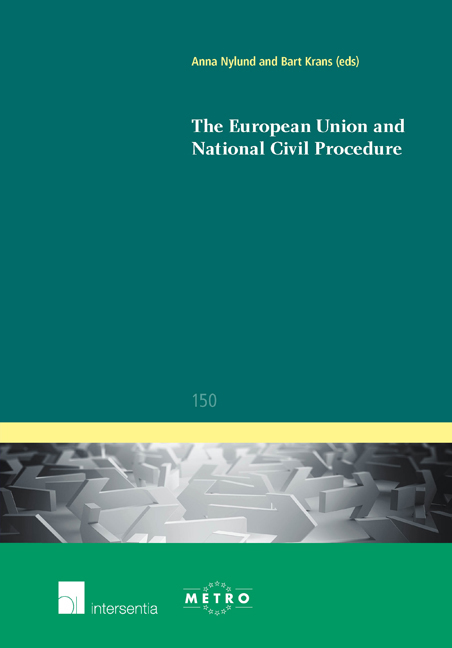Book contents
- Frontmatter
- Contents
- About the Authors
- List of Abbreviations
- The European Union and National Civil Procedure – A Rocky Road or a Smooth Process?
- Some European Challenges for Belgian Civil Procedure
- Danish Civil Procedure and the Internal Market: Impact and Challenges of Sectoral Harmonisation
- European Influences upon English Civil Justice: Tempests or Gentle Breezes?
- European Union and National Civil Procedure: The French Paradox
- The European Union and Civil Procedure from a German Perspective
- Interaction between European Law and Hungarian Civil Procedure Law
- The Impact of EU Law on Dutch Civil Procedure Law
- Norway: An Insider Outside – or an Outsider Inside – European Civil Justice
- Polish Civil Proceedings: How Much Europeanised?
- Slovenian Civil Procedure and the Transformative Power of the EU
- The Curious Incident of the Dog in the Night-Time: Europeanisation of Civil Procedure in Sweden
- Conclusions and Outlook
- Index
- Miscellaneous Endmatter
Interaction between European Law and Hungarian Civil Procedure Law
Published online by Cambridge University Press: 19 December 2017
- Frontmatter
- Contents
- About the Authors
- List of Abbreviations
- The European Union and National Civil Procedure – A Rocky Road or a Smooth Process?
- Some European Challenges for Belgian Civil Procedure
- Danish Civil Procedure and the Internal Market: Impact and Challenges of Sectoral Harmonisation
- European Influences upon English Civil Justice: Tempests or Gentle Breezes?
- European Union and National Civil Procedure: The French Paradox
- The European Union and Civil Procedure from a German Perspective
- Interaction between European Law and Hungarian Civil Procedure Law
- The Impact of EU Law on Dutch Civil Procedure Law
- Norway: An Insider Outside – or an Outsider Inside – European Civil Justice
- Polish Civil Proceedings: How Much Europeanised?
- Slovenian Civil Procedure and the Transformative Power of the EU
- The Curious Incident of the Dog in the Night-Time: Europeanisation of Civil Procedure in Sweden
- Conclusions and Outlook
- Index
- Miscellaneous Endmatter
Summary
Introduction
The influence exerted by European Union civil procedure on the national laws of the Member States has been greatly influenced by the path the individual States had to follow in order to acquire full rights of membership. This does not only mean how much time the given States had to spend as a candidate country, but also whether before their entry they had become parties to such international agreements or organisations that had made it necessary for them or even required them to harmonise their national legal systems with those agreements. As an example one might mention admission into the Council of Europe and ratification of the European Convention on Human Rights, as a consequence of which some fundamental human rights also having an effect on the administration of justice (e.g. the principles of fair process or adversarial hearing) have become built into the national legal systems. Countries having joined the Hague Convention of 1965 on the Service of Court Documents or the Hague Convention of 1970 on the Taking of Evidence had become well-versed in applying rules that were later, even if with a changed content, to form part of regulations issued in the frames of European judicial cooperation. The greatest experience in the application of rules of European civil procedure law – while not being a member of the European Union – was afforded by participation in the Lugano Convention: The Convention concluded in 1988 was ratified by Austria in 1996 and Poland in 2000. However, in the case of Austria the application of the Lugano Convention only meant a mere two-year ‘advantage’, since following her accession to the European Union in 1995, beginning from 1998 she was able to apply the Brussels Convention. Poland had gained four years’ experience in the application of the common rules relating to the recognition and enforcement of court judgements prior to her accession to the European Union in 2004. The loser in this process was undoubtedly Hungary, which announced its intention to join the Lugano Convention in 1997, but having made the required statements and declarations, she failed to obtain support for her entry from the participating states.
- Type
- Chapter
- Information
- The European Union and National Civil Procedure , pp. 73 - 88Publisher: IntersentiaPrint publication year: 2016



